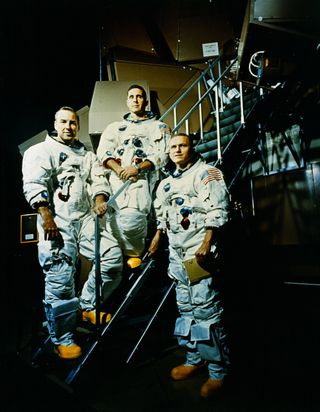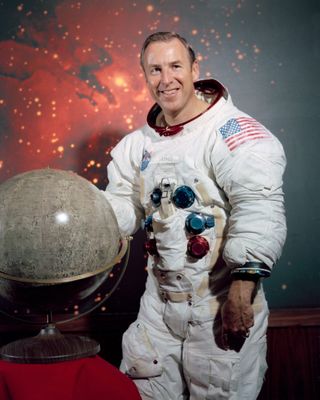Apollo 8 Astronaut James Lovell Looks Back On a Historic Flight Around the Moon
The trio of Apollo 8 astronauts were the first people to look back at Earth in all its glory from space, when they snapped the now-iconic "Earthrise" photo of a gleaming terrestrial orb hanging over the moon's gray-scale surface. They celebrated Christmas in space, broadcasting their reflections on the flight and the holiday back to Earth.
Their safe landing on Dec. 27 was a major milestone in the Apollo program, which Lovell flew in again as part of the near-disastrous Apollo 13 mission. Fifty years later, Lovell shared his thoughts on the flight and what came after it. This interview has been edited for length and clarity. [Apollo 8: NASA's First Crewed Trip Around the Moon in Pictures]
Space.com: With this big anniversary coming up, what really stands out for you about your first trip toward the moon?
James Lovell: Of course, that was the highlight of my space activities at that time. I had two significant missions: one was, of course, Apollo 8, which was significant to everybody, and then Apollo 13, which was more or less a mission of "get us home safely" … This mission [Apollo 8], I think, had more impact on people around the world than any of our space missions, because the "Earthrise" picture was one of the things that really amplified that. But also it took people away from the Earth for the first time, to essentially another planet, or another body, so in that respect, I think it was quite significant.

Space.com: Did you and the others who were on the mission feel that responsibility as you were preparing for the mission? Did that weigh on you?
Lovell: No, because when we were told that this is not going to be an Earth-orbital flight, which I had made two before going to the moon, then we really got digging in to really work to do it. You only had four months. We did the day-to-day activities of all about learning the navigation, looking at the trajectories, what we were going to do around the moon, looking at the photographs. We were involved in that. I never thought, "Holy cow, I'm going to the moon." It wasn't until the day that I was getting into the spacecraft when I suddenly realized that this is not another Earth-orbital flight — this is something entirely different.
Get the Space.com Newsletter
Breaking space news, the latest updates on rocket launches, skywatching events and more!

Space.com: How do you feel about the fact that we haven't gone back since 1972?
Lovell: I'm disappointed. I thought that we had digressed quite a bit. The shuttle program was very interesting, but it was something where I wonder if we really got from the International Space Station, did we really get what we put into it? … Originally, when I started working on that program after Apollo, we were going to look back at the Earth and learn more about the Earth itself so that we could help the population down below. Whether that has really been accomplished or not, I don't know. There's a lot of things we could have done.
Space.com: What do you think it is about the Apollo 8 mission that still resonates with people?
Lovell: Well, there are several things that are going to be represented here [at a commemorative event called "The Spirit of Apollo" held at Washington National Cathedral] — I mean, the first flight to the moon, and the fact that we saw the Earth as it really is. We're so close to the Earth that our worlds are only as far as the eye can see. Right here, this building, our worlds exist within these walls. But suddenly, when you get out there and see the Earth as it really is, and when you realize that the Earth is only one of nine planets and it's a mere speck in the Milky Way galaxy, and it's lost to oblivion in the universe — I mean, we're a nothing as far as the universe goes, or even our galaxy. So, you have to say, "Gee, how did I get here? Why am I here?"
Email Meghan Bartels at mbartels@space.com or follow her @meghanbartels. Follow us @Spacedotcom and Facebook. Original article on Space.com.
Join our Space Forums to keep talking space on the latest missions, night sky and more! And if you have a news tip, correction or comment, let us know at: community@space.com.

Meghan is a senior writer at Space.com and has more than five years' experience as a science journalist based in New York City. She joined Space.com in July 2018, with previous writing published in outlets including Newsweek and Audubon. Meghan earned an MA in science journalism from New York University and a BA in classics from Georgetown University, and in her free time she enjoys reading and visiting museums. Follow her on Twitter at @meghanbartels.
